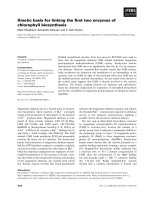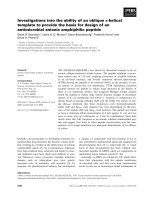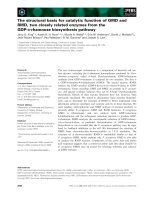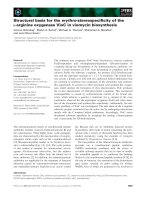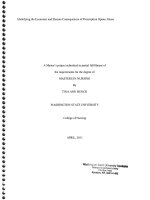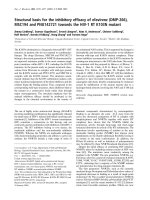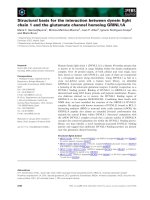Nursing Theory: The Basis for Professional Nursing
Bạn đang xem bản rút gọn của tài liệu. Xem và tải ngay bản đầy đủ của tài liệu tại đây (283.46 KB, 44 trang )
Chapter 13: Nursing Theory:
The Basis for Professional
Nursing
Bonnie M. Wivell, MS, RN, CNS
Nursing Theory
Latin “a viewing”; Greek
“contemplating”
A body of knowledge shaped by how
nurses see the world
A group of related concepts, definitions
& statements that propose a view of
nursing phenomena from which to
describe, explain or predict outcomes
Abstract ideas
Why is Theory Important?
Nursing is strengthened when
knowledge is built on sound theory
Criteria to be a profession: distinct body
of knowledge as the basis for practice
Nursing must be viewed as a scholarly
academic discipline hat contributes to
society
Ultimate goal is to support excellence in
practice
Theory Guides the Professional
Nurse in….
Organizing and analyzing patient data
Understanding connections between pieces
of data
Discriminating between important and less
pertinent data
Making sound clinical judgments based on
evidence
Planning effective nursing interventions
Predicting and evaluating outcomes of
interventions
Definition of Terms
Metaparadigm = the major concepts or
abstract ideas of the discipline; most
important to practice and research
Person
Environment
Health
Nursing
Philosophy = a set of beliefs about the
nature of how things work and how the world
should be viewed; begins to put together
some or all concepts of the metaparadigm
Definition of Terms Cont’d.
Conceptual Model or Framework = a
more specific organization of nursing
phenomena than philosophies; provide
an organizational structure that makes
clearer connections between concepts
Propositions = statements that
describe linkages between concepts
and are more prescriptive; they
propose an outcome that is testable in
practice and research
Florence Nightingale
Notes on Nursing: What It Is and What It Is Not
(1969, originally published in 1859)
Her philosophy of health, illness, and the nurse’s role in
caring for patients
Focused on the relationship of patients to their
surroundings
Importance of observing the patient and
recording information
Importance of cleanliness
Health and recovery from illness is related to
environment
Virginia Henderson
The “Unique function of he nurse… is to assist
the individual, sick or well, in the
performance of those activities contributing
to health or its recovery (or a peaceful death)
that he would perform unaided if he had the
necessary strength, will or knowledge.”
Nurse’s role = substitute for the patient, a
helper to the patient or a partner with the
patient
14 basic needs of the patient (see Box 13-3
on pg. 308)
Jean Watson
Studied at CU
The Philosophy and Science of Caring (1979)
Emphasized the caring aspects of nursing
10 Carative factors (see Box 13-4 on pg. 309);
these factors differentiate nursing from medicine
(curative)
Illness or disease equated with lack of harmony
within the mind, body, and soul
RN responsible for creating and maintaining an
environment supporting human caring while
recognizing and providing for patient’s primary
human requirements
Watson Continued
Proposed that nursing be concerned with
spiritual matters and the inner knowledge of
nurse and patient as they participate
together in the transpersonal caring
process
Nurses share their genuine self
Patient’s spiritual strength is recognized,
supported, encouraged
RN encourages openness to understanding of self
and others
Leads to trusting, accepting relationships where
feelings are shared and confidence is inspired
Dorothea Orem
Concept of self-care
“Ordinary people in contemporary society
want to be in control of their lives.”
Patient’s baseline ability to provide
adequate self-care is assessed
Systems of care
Wholly compensatory
Partially compensatory
Supportive-educative
Imogene King
A Theory for Nursing: Systems, Concepts, Process
(1981)
Focused on persons, their interpersonal relationships,
and social contexts with three interacting systems
Personal
Interpersonal
Social
Emphasizes goal attainment and patient’s
involvement in setting goals (Goal Attainment Model)
Sister Callista Roy
Introduction of Nursing: An Adaptation Model
(second edition 1984)
Individual as a biopsychosocial adaptive
system
Nursing is a humanistic discipline that
emphasizes the person’s adaptive and coping
abilities
The environment can be manipulated by the
RN to further patient’s adaptation
Hildegard Peplau
Interpersonal Relations in Nursing (1952 & 1988)
Relationship between patient and nurse is the
focus of attention
Therapeutic interpersonal relationship
Survival of the patient
Patient’s understand his or her health problems and
learn from them as they develop new behavior patterns
6 roles of the nurse: counselor, resource,
teacher, technical expert, surrogate, and leader
Ida Orlando
The Dynamic Nurse-Patient Relationship:
Function, Process and Principles (1961)
Observation and confirmation of patients’
verbal and non-verbal behavior, which
identify patient needs
Goal of the nurse is to determine and meet
patients’ immediate needs and improve their
situation by relieving distress or discomfort
Individualize care by attending to behavior
Madeleine Leininger
Theory of cultural care
Founder of Transcultural nursing
Patients viewed in the context of their cultures
Nursing care should be culturally congruent
“Sunrise Model” (Figure 13-2, pg. 317) guides
the assessment of cultural data for an
understanding of its influence on the patient’s
life
Theory-Based Education
PhD: a research degree that generates
new, discipline-specific knowledge
Master’s: use theoretical perspectives
focused on the patient for specific
nursing outcomes; base practice on
evidence from research & experience
BSN: introduced to research process &
the use of theory to guide it
ADN: find middle range theories useful
as they are specific to patient care
Theory-Based Practice
Occurs when nurses intentionally structure
their practice around a particular nursing
theory and use it to guide them in their
care of the patient
Provides a systematic way of thinking
about nursing that is consistent and guides
the decision-making process
Challenges conventional views of patients,
illness, the health care delivery system,
and traditional nursing interventions
Benefits
Explain practice to others
Passes on knowledge to students
Contributes to professional
autonomy
Develops analytical skills, challenges
thinking, and clarifies your values
and assumptions
Theory-Based Research
Great strides have been made in the
last 25 years in nursing research
Nursing research tests and refines the
knowledge base of nursing
Research findings enable nurses to
improve the quality of care and
understand how evidence-based nursing
influences patient outcomes
Research is vital to the future of nursing
and theory is integral to research
